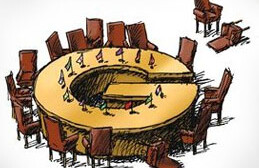This article first appeared on The Huffington Post on March 9, 2012. It is being reposted with the permission of the author Devin Stewart, senior program officer at Carnegie Council. Ian Bremmer is a Carnegie Council trustee.
"This book is not about the decline of the West," political scientist Ian Bremmer assures us in the introduction of his new book. "Nor is this a book about the rise of China and other emerging markets." Well, that's a relief.
Many pundits are giddily predicting the end of American preeminence and China's inevitable domination, but we have all seen that movie before. The declinists are proven wrong time after time. By contrast, Bremmer's Every Nation For Itself: Winners and Losers in a G-ZERO World (Portfolio, May 2012) provides a fresh perspective on world politics. It is an exciting contribution to the galaxy of big ideas on international affairs. Some of his conclusions are startling; he therefore warns his book is not "the feel-good movie of the year."
In a concise 200 pages, Bremmer wastes no time getting to his point: to tackle today's global challenges—from transnational threats to financial stability to managing energy needs—the world needs a dominant power that can "enforce compromise." But given the shrinking power gap between countries, such a Leviathan is missing, and global institutions are getting rickety. Now, "many countries are strong enough to prevent the international community from taking action, but none has the political or economic muscle to remake the status quo. No one is driving the bus."
The G7 is out-of-date while the G20 is too unwieldy, like "herding cats . . . together with animals that don't like cats." Hence the G-Zero. It's a world of spoilers but no leaders, and it points to a potential downside to U.S. President Barack Obama's strategy of "leading from behind." Just when cooperation is most needed, it has become more difficult to achieve.
Origins of the G-Zero
Bremmer's thesis reflects a growing consensus. Other thinkers have made similar arguments over the past few years. Council on Foreign Relations president Richard Haass, for example, calls this problem one of non-polarity. After the world witnessed two sides competing during the Cold War, we now live in a world in which no single state can drive cooperation. Like Bremmer, Haass suspects that, "The emergence of a non-polar world could prove to be mostly negative, making it more difficult to generate collective responses to pressing regional and global challenges."
Similarly, Harvard scholar Joseph Nye has pointed out that power is becoming more diffuse in international politics, making the world more complex, like a "three-dimensional chess game." Others who have noticed this problem include Nikolas Gvosdev, Harry Harding, John Ikenberry, Parag Khanna, Michael Mandelbaum, Anne-Marie Slaughter, and Fareed Zakaria.
At Carnegie Council we hosted several of these thinkers in our "Rise of the Rest" series. In 2008 when we asked Harding whether cooperation would be possible in the face of rising powers, he responded optimistically. He said, one way cooperation would be possible is when "the problems are so great, both parties realize they have to work together or the consequences would be extremely dire. And I suspect climate change is going to be one. Perhaps energy security will be another."
Harding has logic on his side. If the consequences of climate change are as catastrophic as some experts predict—from the mass extinction of species to the destruction of whole countries—it should compel countries to work together. Global pandemics and nuclear proliferation should do the same. Given that the human race has avoided apocalyptic scenarios in the past, it stands to reason that it will continue to do so. Bremmer also concedes the G-Zero world is temporary; we will see the power vacuum filled if we do not see a global cataclysm first.
Although Bremmer contends his book is not the story of "the rise of the rest," the problem he has identified is a direct consequence of the relative rise of non-Western states. To this point, his chapter titled "The Road to G-Zero" could serve as an overview of any college International Relations 101 course that teaches how the world developed since 1945. Washington-led globalization has "created multiple emerging alternatives to American power, including a loose collection of developing countries with leaders looking to satisfy public demand for a more prominent global role by dabbling in international politics. They want status."
But isn't this new world what the architects of American grand strategy, such as Dean Acheson, envisioned after World War II? The deal that the United States struck with the world after 1945 was that it would provide secure trade routes, stability, and the opportunity for other countries to become prosperous. In other words, the United States provided public goods. In return, other states would accept American preeminence and would play by American-designed rules. Surely the American architects foresaw that this project could be so successful that it would facilitate a narrowing of power between countries. Bremmer seems to feign surprise at this outcome in order to underscore the danger a G-Zero world poses.
The idea that this world of change carries risk goes back to the realist school of international relations. Princeton scholar Robert Gilpin demonstrated in his classic book War & Change in World Politics (1981) that when the power balance between countries shifts, conflict and even war are more likely. It is for this reason that analysts have worried about the rise of the rest. Indeed many of Bremmer's big ideas over the years have revolved around change and international relations theory.
His The J Curve riffed on an older theory in trade economics to predict instability during political change. In his last book, The End of the Free Market, Bremmer resurrected the 19th-century German idea of state capitalism to anticipate tension between China and free market America. In this regard, Bremmer is an innovator in the truest sense. Like Steve Jobs and the iPad, Bremmer improves ideas and brings them to new audiences.
He presents his view in a clear, logical way and with an urgent tempo that gives the reader the feeling of being in a cinematic briefing in the White House. One can flip through his book and get the point in a matter of minutes. What makes Bremmer's books consistently interesting are the insights he has gathered from traveling the world talking with insiders, the practical applications of his ideas, and his use of colorful stories to illustrate his points. He also happens to be correct on the great questions of our time, skeptical about the sustainability of China's rise and America's so-called inevitable decline.
The Future of the G-Zero World
In the most daring chapter, Bremmer makes some stark predictions. Will countries cooperate in a G-Zero world? Unlike Harding, Bremmer is pessimistic. He outright dismisses a continuation of pure American hegemony and outlines four scenarios based on the direction of U.S.-China relations, which he sees as the most important relationship in the world. A rosy world of U.S.-China cooperation, where other countries are weak, would produce a G2 dynamic where the U.S. and China would run the show. If other countries are strong under U.S.-China cooperation, he sees a "concert" of powers or a G20 that "actually works." He finds the scenarios above unlikely.
Instead, Bremmer predicts U.S.-China friction will be the baseline. If U.S.-China conflict prevails while other countries remain weak, he predicts a "Cold War 2.0" where the "weapons of war will probably be economic," and the two powers vie for influence. That is the second-most likely scenario. Bremmer's most likely scenario is what he calls "a world of regions—to each his own." This is a world with strong states but "without global leadership, one in which many of the rest will rise, but only to tackle local and regional issues"—thus the title of the book. Welcome to a version of "The Clash of Civilizations."
Bremmer throws in a fifth, wild-card scenario called"the G-Subzero," in which "the G-Zero creates the kinds of problems that discredit the state, cripple its credibility, and arouse enough public anger that citizens look for alternatives." In this Mad Max dystopia, power could disintegrate from states to local governments, neighborhoods, gangs, criminals, or militants.
While it's no Hollywood flick, Bremmer's story ends on a happy note. When America competes on a level playing field, he cheers, it is tough to beat. To that end, he recommends that the United States get back to basics, reinvest in globalization, and pursue fiscal responsibility and free trade, for example, by supporting the Trans-Pacific Partnership.
Bremmer rightly reminds us, "There are always second acts in American life. Anyone who believes American decline is inevitable has chosen to ignore the history of the United States and its people." If policymakers heed his advice and break the stasis in Washington, get ready for American resurgent power, the sequel.



